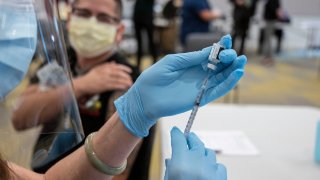
California is expecting to receive nearly 400,000 doses of coronavirus vaccine by the end of the week in addition to the 327,600 doses the state is currently distributing, Gov. Gavin Newsom said Tuesday.
The state received its first shipment of roughly 33,000 vaccines from the pharmaceutical company Pfizer on Monday, with thousands more being delivered "as we speak, into the evening, into the rest of the week," according to Newsom.
That initial allotment is being dispersed to health care facilities and hospitals as well as nursing homes and similar congregated care facilities. Vaccines have already arrived in San Francisco, Contra Costa County and San Joaquin County.
More than 30 locations across the state are expected to receive vaccine deliveries between Monday and Wednesday, Newsom said. "We're finally seeing those we value the most, we've celebrated since the beginning of this pandemic, get that support," Newsom said of health care workers having access to the vaccine. "Those emergency room (doctors) and nurses, folks there on the front lines of this pandemic and have been there from the beginning," he said.
Newsom said the state expects to receive another 393,000 vaccine doses from Pfizer later in the week as well as 672,000 doses of the vaccine developed by the biotechnology company Moderna by the end of the month.
The Moderna vaccine still requires approval from the U.S. Food and Drug Administration.
California
Assuming that approval happens in the coming days, the state could have as many as 2.1 million vaccine doses by the beginning of January, according to Newsom. California's advisory committee overseeing vaccine safety and distribution has separated the first vaccine recipients into phases with several sub-tiers based on risk of contracting the virus.
The first tier of the first phase includes roughly 3 million health care workers and staff and residents at long-term care facilities. In addition, in-home health care workers, primary care clinic workers, laboratory workers, dental health clinic employees and pharmacy staff will be included in the first phase of vaccinations.
Coronavirus Deaths in Your City and State — and Across the US
These charts use daily coronavirus death data from Johns Hopkins University to show the seven-day moving average of deaths at the city, state and country level.
The impact of coronavirus varies enormously in the United States from one place to another.
Source: Johns Hopkins University.
Credit: Visuals by Amy O’Kruk/NBC, data analysis by Ron Campbell/NBC
The committee is still determining who will be included in the following phase of vaccine dispersal, but Newsom said it could include roughly 8 million people, including teachers, farm workers and grocery store workers.
"There's light at the end of the tunnel," Newsom said, "but we're still in the tunnel."
There's a light at the end of the tunnel, but we're still in the tunnel.
Calif. Governor Gavin Newsom
At the same time the vaccine is being distributed, the state will also roll out a campaign to ensure residents in all 58 of the state's counties are vaccinated against the coronavirus.
The state has already invested some $30 million into the "Vaccinate All 58" campaign, which intends to build public trust in the vaccine, especially among the state's disadvantaged communities. "It is incumbent upon us to meet people where they are," Newsom said.
The state will use assets from its campaign encouraging people to complete the decennial U.S. Census to encourage people to get the vaccine when it is available to them.
According to Newsom, the campaign will be reproduced in 13 different languages.
"All Californians need to be included in this vaccination process … (W)e can't leave folks behind," Newsom said. "We talk in terms of equity, we talk in terms of inclusion -- we often advance our values, but we have to make them real and we have to also make them visible to people throughout our diverse communities."



